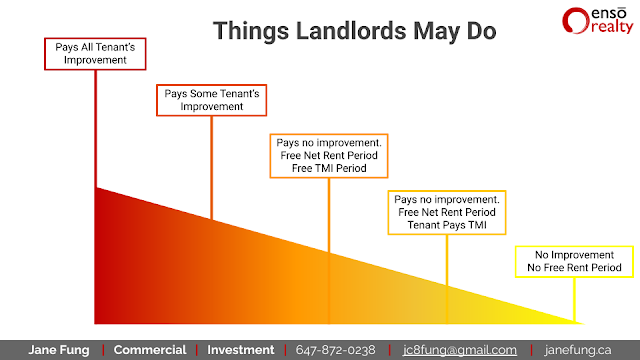Are You Wondering if Landlord Would Cover Your Business Renovation?
When it comes to commercial leasing, clients often ask about the types of things that commercial landlords cover in a lease. What a landlord offers depends on several factors, such as their preferences, practices, the location’s desirability, and the tenant’s profile, as well as the lease terms. In this article, we’ll summarize what landlords may do for their tenants.
If you’re interested in learning more about commercial rent calculation, we have an informative video and article available for you to explore as well.
While there are many types of commercial landlords, the offerings they provide can be categorized into different levels. While this could be a great summary, in reality, landlords may be willing to offer other combinations of terms based on their preferences and abilities.
Landlords Who Pay for All Tenant’s Improvements
This is a rare but ideal scenario for tenants. With this offering, landlords are willing to work with you on your design and renovation and pay for all the improvements needed. This is generally reserved for high-value tenants, and landlords expect to recoup their costs by charging premium rent. One of the downsides of this arrangement is that you may have to work with the landlord’s designer, which can be time-consuming, and you have less control over the design and renovation process. Additionally, if the landlord hires subpar contractors, the quality of work may suffer. Delays caused by the landlord’s renovation and design team can also be a disadvantage, as they are beyond your control.
Landlords Who Pay for Some Tenant’s Improvement
Here, the landlord may agree to do some of the work for free, but the tenant is still responsible for the majority of the improvements. Negotiations can be made to determine which parts of the renovation the landlord will pay for. For instance, if the renovation is related to the common areas or other tenants, the landlord may be more willing to contribute. Additionally, if the landlord can do some work more easily than you, they may offer to do it as well. The advantage of this arrangement is that you can save some money, and yet, you still have control over the renovation process.
Landlords who Offer Free Net Rent and TMI Periods
Instead of covering improvement costs, some landlords may provide a free net rent period and free TMI (taxes, maintenance, and insurance) period. This means the tenant can access the space without paying rent during the agreed-upon period. However, tenants will typically be responsible for utilities and insurance, including builder’s risk insurance during renovations.
Landlords who offer free net rent but require tenants to pay TMI
In this scenario, the landlord provides a free net rent period, but tenants are responsible for paying TMI during the renovation period. Tenants will also be responsible for utilities and any additional insurance required by the landlord.
Landlords Who Offer No Concessions
In some cases, the landlord may not be willing to offer any free rent nor improvement concessions. In this scenario, tenants must begin paying rent, TMI, and utilities immediately before renovation can begin.
It’s important to note that the level of support offered by landlords can vary significantly depending on a variety of factors. The landlord’s preferences and practices can dictate what is included in the lease, and large and small landlords may have differing approaches.
If you want landlords to give you more, you need to make yourself more valuable to them. In the next article, we will cover on the tips on how to attract landlords to give you more favourable terms on a lease.










